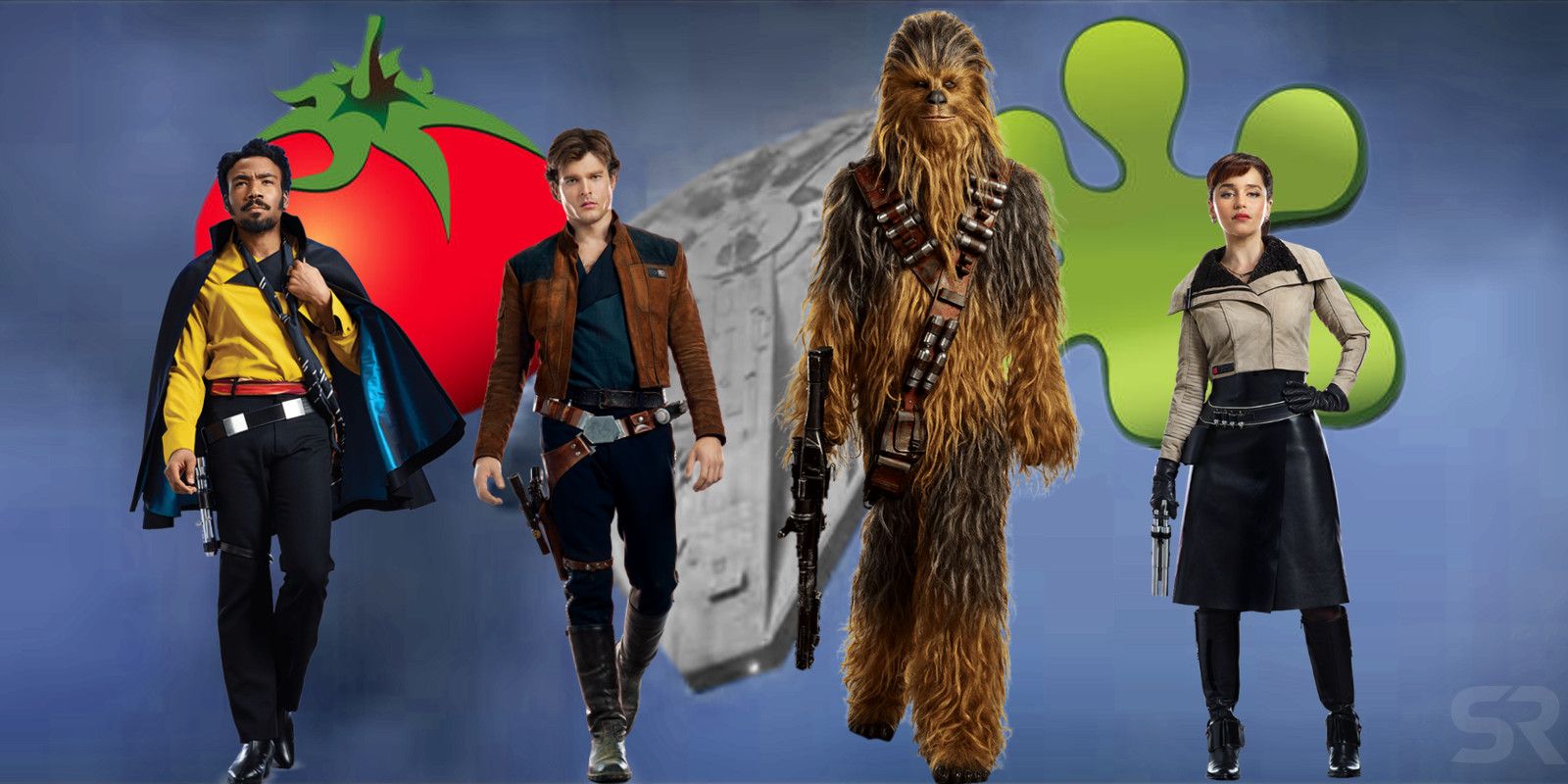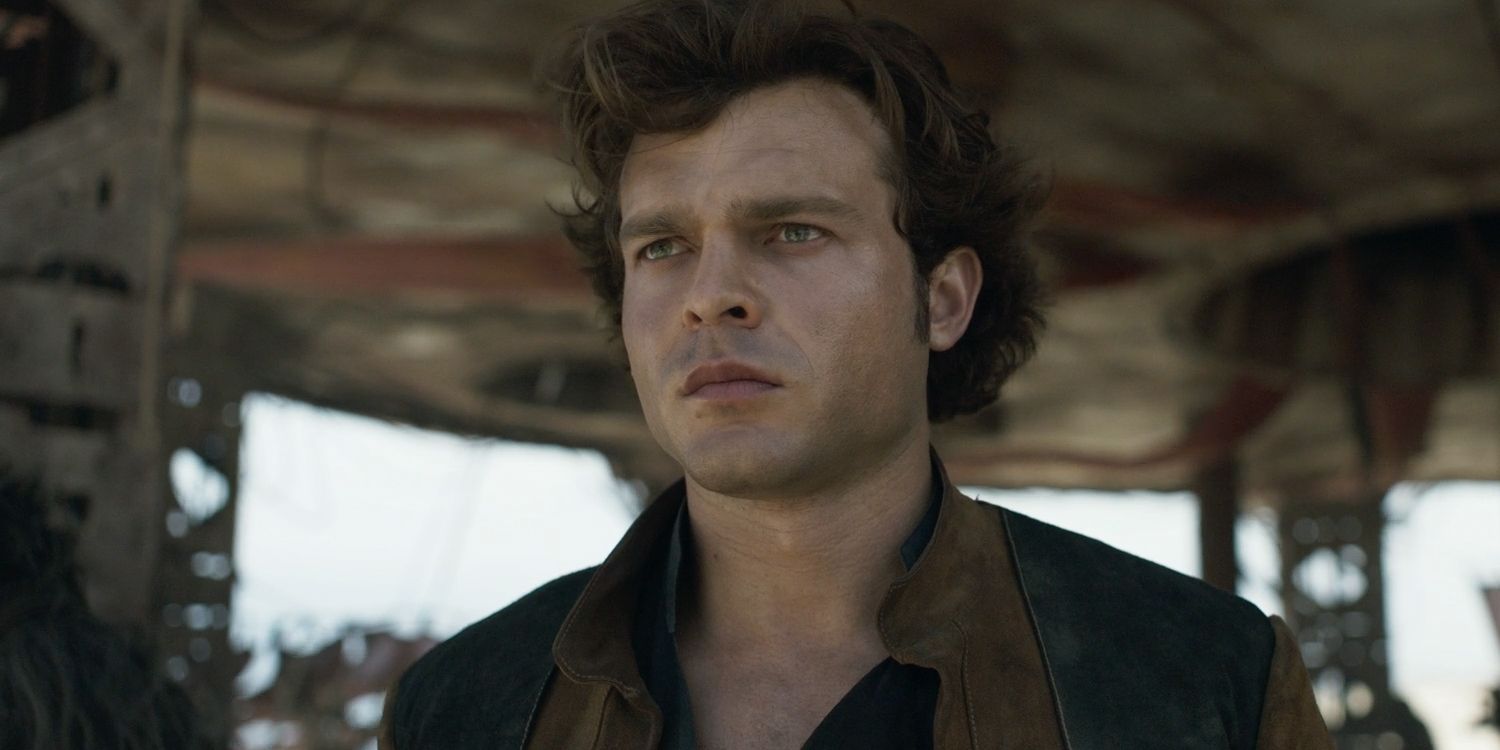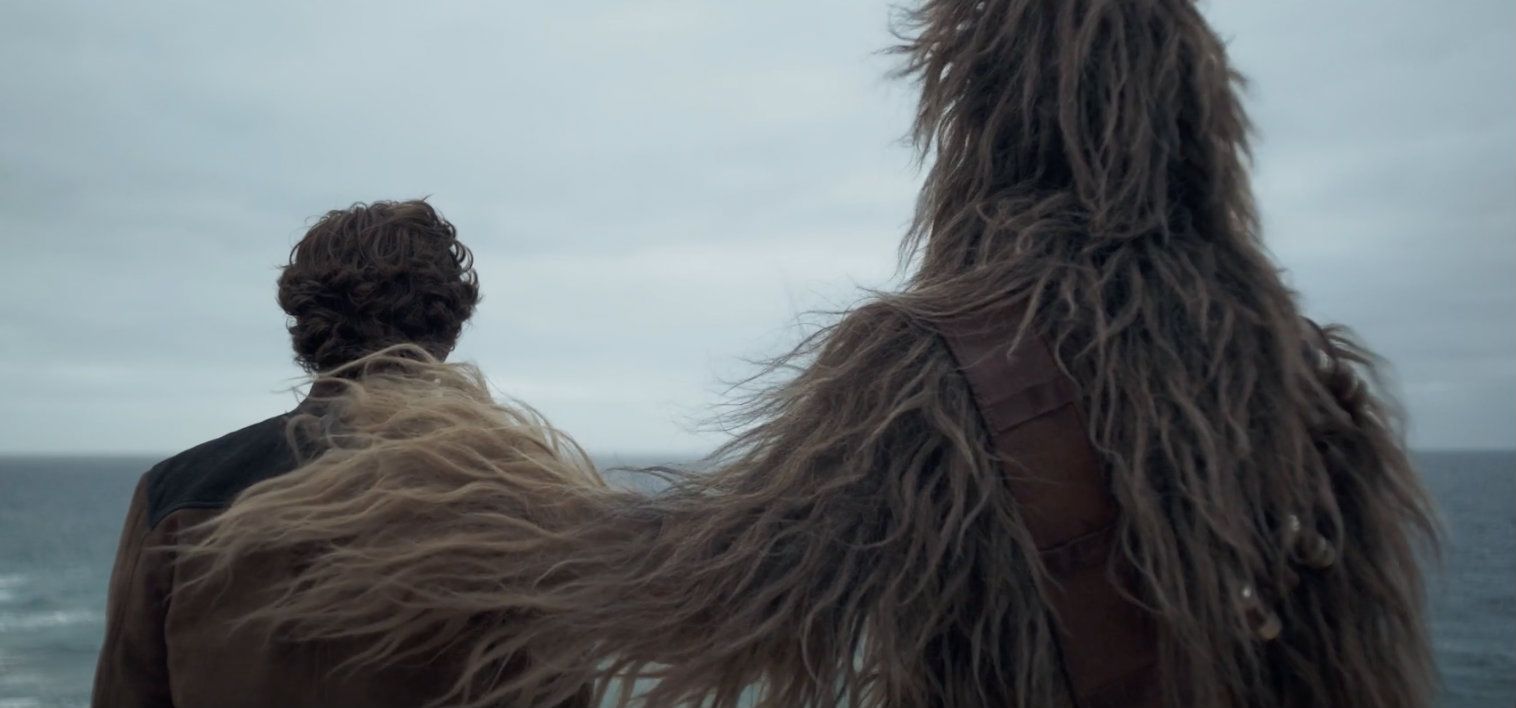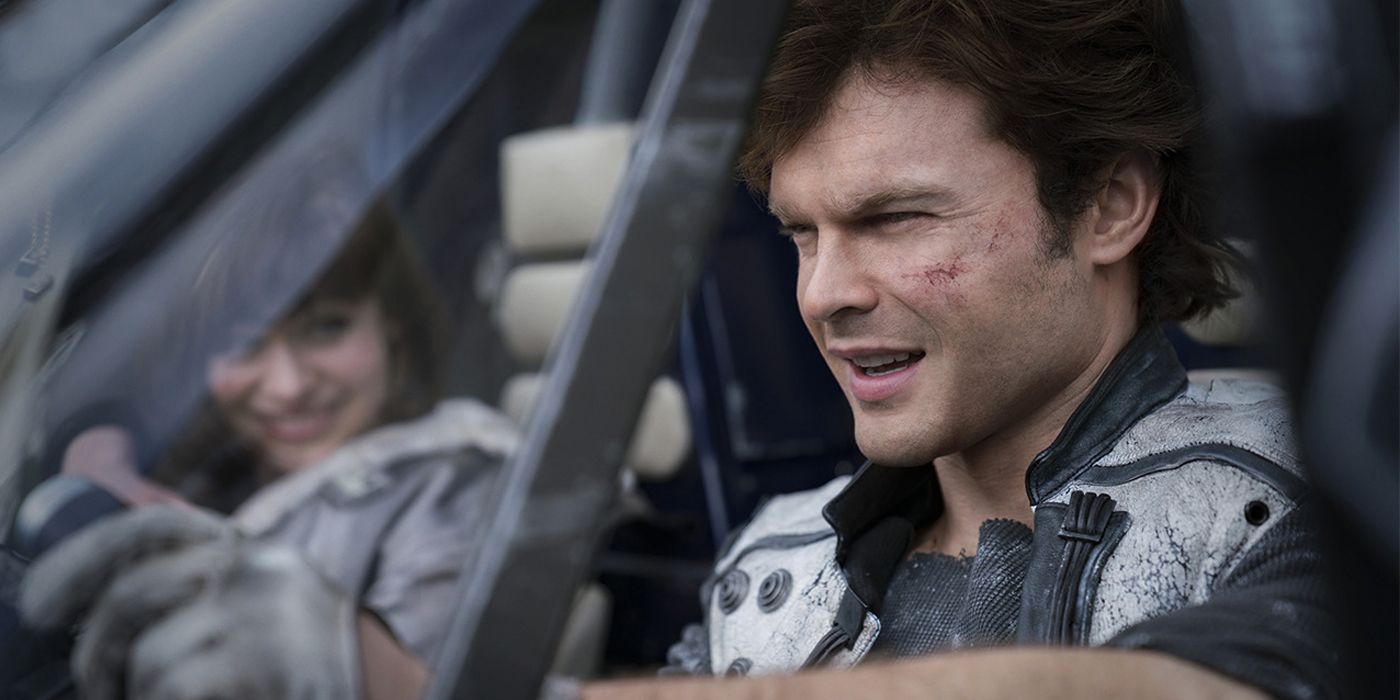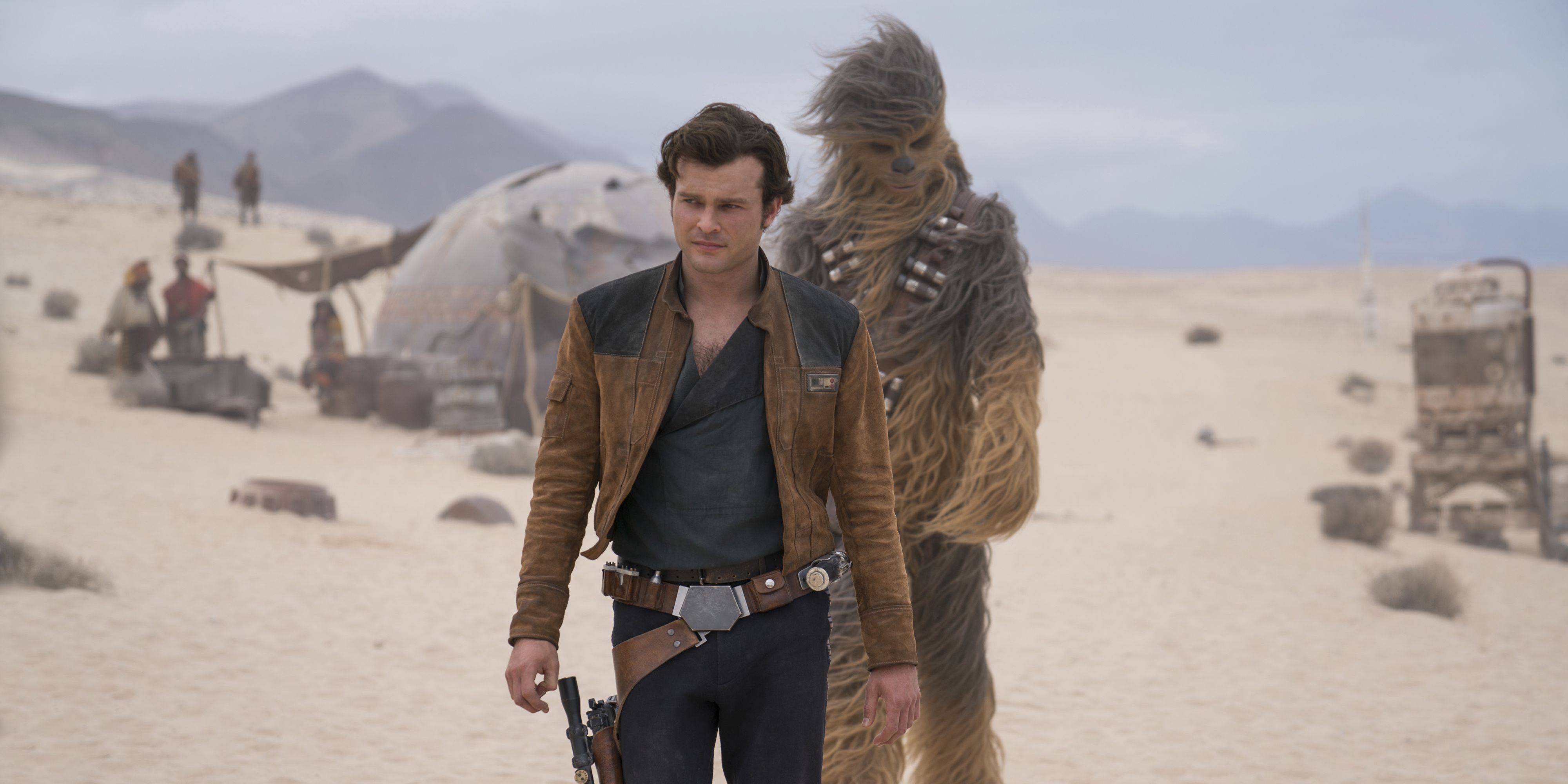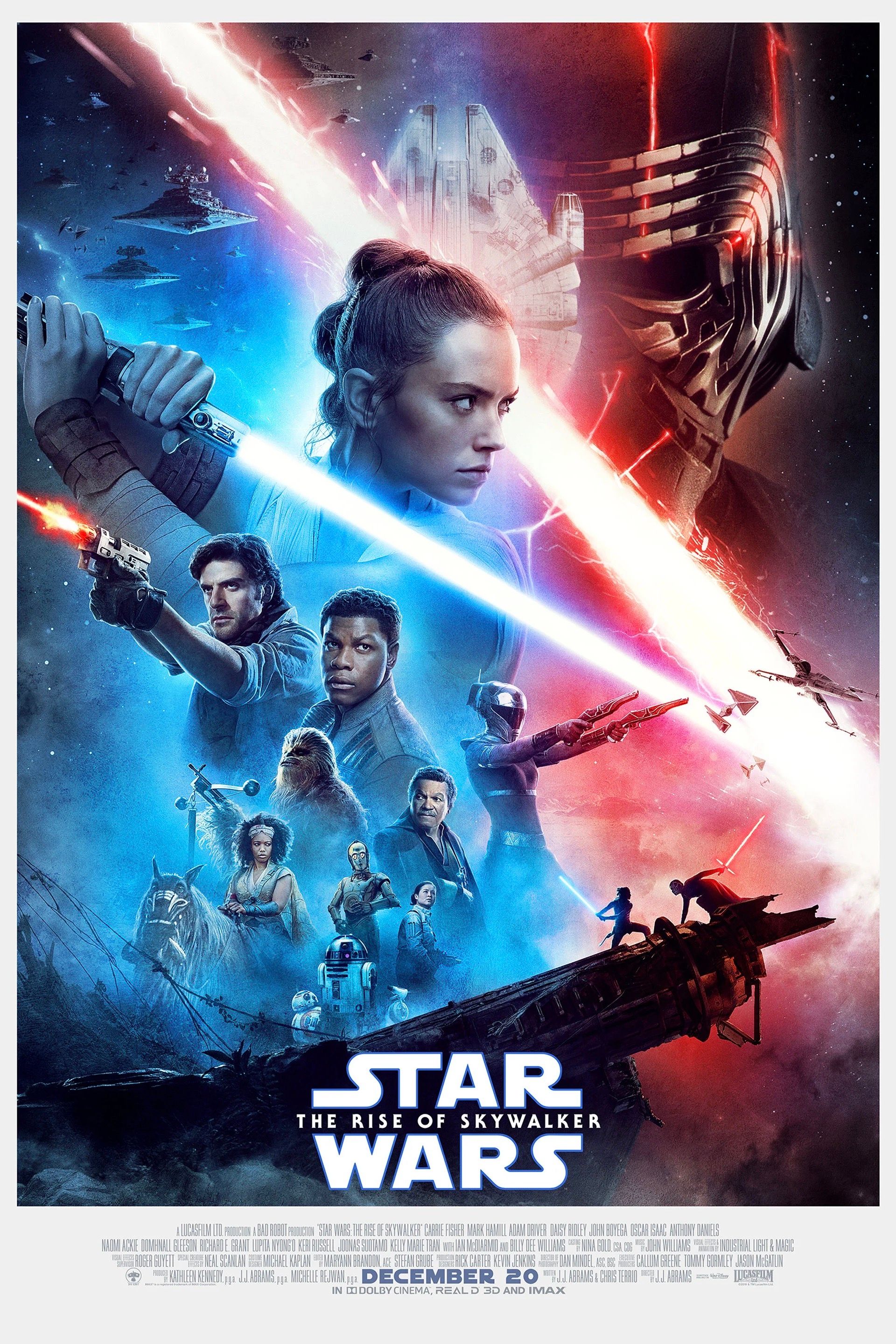Solo: A Star Wars Story has been reviewed with mild positivity, with many critics claiming its entire existence is unnecessary, but it deserves better.
The current critical consensus for Solo: A Star Wars Story seems to be that it's fine. As of the writing of this piece, its Metacritic score sits at 63, indicating mostly positive, if not enthusiastically so, responses. Over on Rotten Tomatoes, its score is 71%, which is once again pretty positive but not in rave territory. Compared to last year's Star Wars: The Last Jedi, which was certified fresh with critics at 91%, or even Rogue One, which has another certified fresh score at 85%, Solo cannot help but seem a tad disappointing by comparison. That, combined with all of the drama surrounding the film and its notoriously difficult production, creates the illusion that the film is worse than it is. It’s not even good, so the consensus says, it’s just fine. In reality, Solo is a kinetic heist movie that provides sturdy origins for one of the franchise’s most beloved characters, as well as some of its most charismatic performances. For whatever reason, it does not have the review score it deserves.
RELATED: The State Of The Empire & Rebellion During Solo
- This Page: Behind The Scenes Drama Overshadowed the Film
- Page 2: The Cast and Origins Story Work
Behind the Scenes Drama Has Overshadowed the Film
So much of the critical conversation surrounding Solo has little to do with the quality of the film itself. It’s near impossible to talk about the film without getting into the torrid topic of its chaotic behind-the-scenes fallout and the various rumors surrounding it. Few reviews omit mentions of the firing of original directors Phil Lord and Christopher Miller several months into principal photography. Many are also quick to mention anonymous on-set gossip of the film’s troubles, including allegations that actor Alden Ehrenreich was struggling with the role. It’s not unusual for a review to delve into such topics. Often, it’s unavoidable, and with a film this hyped and on this scale, such things were to be expected. It’s still an oddity to see that kind of industry reporting dominate critical coverage of the finished product.
It’s the kind of conversations that didn’t follow the last spin-off prequel film in the franchise, Rogue One. While news of that film’s extensive re-shoots was covered by most publications, the drama was softened. Re-shoots are common on films of this scale so people did not assume the worst. It helped that news of director Gareth Edwards being replaced by Tony Gilroy – who later confessed that he had to essentially rewrite and redo major chunks of the film – was also downplayed. It was nothing on the scale of firing your director a few weeks before filming finished, but the narrative of a movie in trouble has plagued Solo far more than Rogue One, and it’s impacted the critical discussion around each film differently.
Where Solo Succeeds
It’s easy to talk about what Solo: A Star Wars Story isn’t, and the drama that overshadows it, but the things that Solo succeeds at are what make it deserving of a far greater critical reception than it has received. Out of the four Star Wars films audiences have seen in the post-Disney acquisition age, it is Solo that is the most pure and unabashedly fun of the lot. Sharing more of its cinematic DNA with Golden Age gangster and Western movies than anything classically sci-fi, Solo is a kinetic heist movie that disguises its more conventional origin story roots. At the heart of this film is an old school “get the gang together” crime adventure, not unlike the pulp stories that inspired Star Wars in the first place.
Structurally, it’s far more focused and tightly constructed than Rogue One, a film with major pacing and foundation issues that are widely overlooked because of the gutsy bleakness of its ending. This is a Star Wars film where the force plays no part in the action: This is a story of the people on the lowest rungs of the ladder trying to scrape together a living under dire circumstances and a corrupt system of gangsters and crime syndicates. For such a tale, Han is the perfect hero, and the story serves his character well.
RELATED: Solo: A Star Wars Story's Ending Explained - How It Changes Han Forever
Page 2: The Cast and Origins Story Work
The Cast is Excellent
Out of every actor who has joined the Star Wars franchise since its revival, Alden Ehrenreich may have had the hardest and most thankless task in playing the young Han. Everyone knows what Han looks, sounds and acts like, thanks to the iconic work of Harrison Ford, and the love for that portrayal stretches across generations. Asking any actor to step into those shoes and evoke a pop culture legend while making the part their own is an impossible objective. On-set rumors made much of the story of Ehrenreich having an acting coach help with his performance, a common occurrence on any movie. Ultimately, Ehrenreich knocks it out of the park, imbuing just enough Harrison Ford style charm into his performance while nailing the dorky sweetness of a younger, more idealistic Han.
He’s also surrounded by actors of immeasurable charisma: Donald Glover’s Lando is electric in his magnetism, Woody Harrelson’s brand of slacker heroism is perfectly used, Phoebe Waller-Bridge as droid L3-37 is a comedic delight, and Paul Bettany’s giddy scenery chewing is perfectly suited to the film.
Why Han's Origin Story Works
Many critics and fans wondered why Han Solo needed an origin story to begin with. With such an expansive universe at their fingertips, was it really necessary to focus on someone we’ve had four movies with already? Questions of necessity don’t feel relevant to the story at hand, although it certainly seems to have affected the conversation around Solo. However, the way that the film approaches Han’s roots is fascinating and more deftly handled than it’s getting credit for.
RELATED: How Solo Sets Up The Boba Fett Spinoff Movie
Han’s origin is at its weakest in those moments when it feels like the screenwriters are ticking off boxes: Here’s how Han Solo got his name, here’s how he met Chewie, and so on. The need to hit these marks, which is completely expected in a film of this magnitude, exacerbates claims of the film’s supposed lack of reason for being. That mentality ignores how these moments are nowhere near as dominant in the narrative as various reviews would have you believe, and it overlooks the dexterity with which Jonathan and Lawrence Kasdan show the evolution of young Han’s motivations. Before he became the sardonic anti-hero that we see in A New Hope, he was an idealist whose heart always skewed towards doing the right thing. In-between bouts of geeky awkwardness, he demonstrated his skills and drive, but remain rooted in a starker view of good versus evil. As much as he wants to believe he’s a devilish rogue with no concern for the law, he cannot help himself from trying to be an old-school hero. Solo doesn’t show Han’s full descent into cynicism, but through his actions and motivations, the seeds of it are planted for future installments, and it makes for some of the film’s most rewarding moments.
Star Wars fatigue will inevitably hit audiences, as many critics have noted, and various Solo: A Star Wars Story reviews feel like the first hints of that phenomenon. Yet all that does is downplay the successes of the film itself, one that has fought past a messy production and creative drama to emerge as a rollicking adventure that can stand proudly among the best films in the series. It’s near impossible to talk about Solo without weighing in on its accompanying baggage, but that doesn’t mean we shouldn’t try. This is a film that deserves a critical evaluation that goes beyond whether or not people think it’s necessary, or how much they crave the mythic version Lord and Miller would have made. Solo: A Star Wars Story is by no means a critical disaster, but in the context of this franchise and these critical conversations, it most certainly deserves better.

